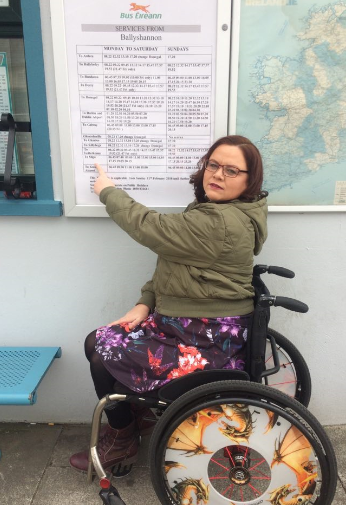My Journey Matters is a campaign launched in March 2019 calling on the Government to implement a robust system of enforcement and sanction for public and private transport operators who fail to address legal requirements for accessibility.

The campaign originated at local advocacy level when students and people using Rehab Care’s services reported the difficulties they had using public transport and complaining where it was inadequate or sub-standard. Rehab Group conducted a survey which found 90 per cent of people with disabilities surveyed don’t have enough access to public transport. One in four respondents said that access to transport ‘always’ limits their independence.
From this the campaign was born…
Rehab Group finds inadequate public transport limits independence of one in four people with disabilities
On the one-year anniversary of the ratification of the UN Convention on the Rights of People with Disabilities, Rehab Group is calling on the Government to implement a robust system of enforcement and sanction for public and private transport operators who fail to address legal requirements for accessibility.
The call comes following a survey conducted by Rehab Group which revealed 90 per cent of people with disabilities surveyed felt they don’t have enough access to public transport. One in four respondents said that access to transport ‘always’ limits their independence.
The findings revealed people with disabilities are at the mercy of a public/private transport structure woefully lacking in technological capability and structural efficiency.
Many report being stranded on platforms by broken lifts, unable to access a ramp to board trains, waiting hours for accessible taxis and being left at bus stops because a buggy is in the spot designated for a wheelchair.
At a time when technological advances have empowered and enabled people with disabilities to engage more easily in day-to-day life, we found many are isolated, unable to get to work and relying on the kindness of others for their basic human rights.
Kathleen O’Meara, Director of Communications, Public Affairs and Fundraising with Rehab Group said: “A two-tier system is being created: those who can afford a car and the necessary adaptations and those left isolated. This is not good enough and is happening despite numerous legal undertakings both nationally and at EU level, to make access equal.
“UNCRPD requires Ireland to take appropriate measures to make sure that people with disabilities have access to transport on an equal basis with others. This includes finding and removing obstacles and barriers that exist in relation to buildings, roads and transport (Article 9).
“In reality, Ireland complies with the legal requirements but not the spirit of the Convention in relation to transport. People with disabilities have a right to accessible public transport, enshrined in law but more often than not a lack of, or patchy, implementation means that their travel is hugely hindered on a daily basis.
“Unfortunately, Ireland has yet to ratify the Optional Protocol of the UNCRPD which would allow individuals and groups to make direct complaints to the Committee on the Rights of Persons with Disabilities for violations of their rights under the Convention. Transport issues will likely feature heavily among complaints when it does.”
Rehab Group is calling on the Government to prioritise the creation a nationwide accessible transport service for all which would see:
- An end to notice periods for people travelling with a disability (informal or otherwise) on private, State and semi-state services, ensuring spontaneity of travel for all.
- Guaranteed accessibility at all DART and train stations, whether manned or unmanned.
- Immediate repair of essential infrastructure: lifts, real-time information, announcements, or for alternative measures to be implemented.
- Guaranteed accessibility to bus services run by private operators.
- Increase in the numbers of accessible taxis across Ireland.
- Reinstatement of Motorised Transport Grant and Mobility Allowance.
- The creation of a single body to oversee and take full authority for integrating accessibility throughout the transport system, streamlining the complaint system for users, and with the power to sanction and name and shame all operators who fail their passengers.
Kathleen O’Meara added: “Under the Disability Act 2005, there is the right to complain where a public body is delivering a service which isn’t integrated for people with disabilities. Currently, such passengers are told to approach each operator separately, if they are not happy the complaint goes to the Ombudsman. The process requires the consumer with a disability to identify the legislation concerned. This is in itself arduous and inaccessible.
“Thirteen percent of the population is living with a disability, and we are all just one accident or medical event away from acquiring one. Access to transport is a vital component for people with disabilities to achieve full participation in the economic and social life of society. Everybody’s journey should matter equally, it’s time for real movement on this issue from the State and transport operators at all levels.”
Ninety per cent of people with disabilities feel they do not have enough access to public transport – survey,says Irish Examiner.
Many report being stranded on platforms by broken lifts, unable to access a ramp to board trains, waiting hours for accessible taxis and being left at bus stops because a buggy is in the spot designated for a wheelchair.
One in four respondents said that access to transport ‘always’ limits their independence, as reported in Breaking News.
The survey was conducted by Rehab Group as today marks one year since the ratification of the UN Convention on the Rights of People with Disabilities.
Woman’s college hopes may be dashed as bus cannot take wheelchairs – reports The Irish Times
Rehab regrets two-tier system for those who can buy adapted cars and those who cannot…